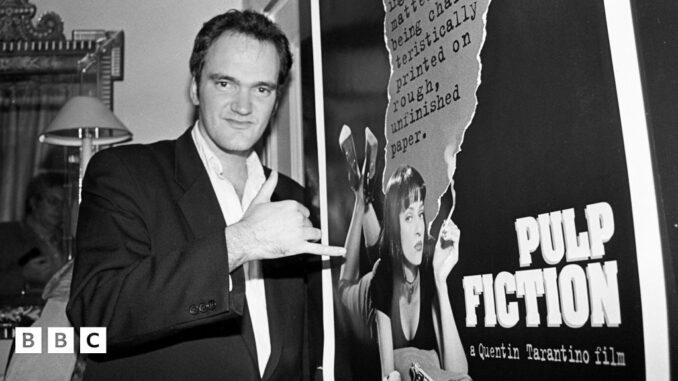
Video Archives was a mecca for all manner of film buffs and it was an environment Tarantino thrived in. He became known for fervently, and often forcefully, recommending films to store patrons, some of whom were already working in Hollywood.
He would enthusiastically recount scenes to them, engaging in long discussions about the intricacies of certain movie plot points or the nuances of different characters.
“A customer [could] come into the store and he could ask me about an obscure film and I might be able to tell the year it was directed, who directed it and maybe who the leads were,” said owner Lawson.
“Quentin would go on to tell you who the supporting cast was, who the DP [director of photography] was, who wrote the screenplay and probably do a couple of scenes from the film with the dialogue verbatim, that’s the difference between Quentin and I.”
“Video Archives was a very relaxed atmosphere. They had popcorn available. So I’m a popcorn fan and I would eat popcorn and chat with Quentin,” film and TV producer John Langley told the BBC In 1994.
“I always got a kick out of talking with Quentin because he was always so opinionated about everything under the sun.”
These discussions with fellow film obsessives were instrumental in honing Tarantino’s critical eye and teaching him to trust his instincts when it came to film. They also cultivated in him the ability to persuasively articulate to someone else what made a movie great. As a store clerk he would effectively ‘pitch’ movies he thought were good to customers. This was critical for preparing him for Hollywood.
“What you find out fairly quickly in Hollywood is this is a community where hardly anybody trusts their own opinion. People want people to tell them what is good, what to like, what not to like,” said Tarantino.
“Now here I came, alright I’m a film geek. My opinion is everything, alright. You can all disagree with me, I don’t care alright. I know I’m right as far as I’m concerned and I’ll argue anybody down.“
His exposure to such a wide range of cinema imbued Tarantino with a distinct cinematic vocabulary which would shape his later films. His movies constantly reference other films – for example the opening shot of his 1997 Blaxploitation film, Jackie Brown, mirrors an early shot in Mike Nichols’ The Graduate (1967). But rather than feeling derivative, in Tarantino’s films this amalgamation of different genres, film influences and pop culture feels fresh and original.


Be the first to comment